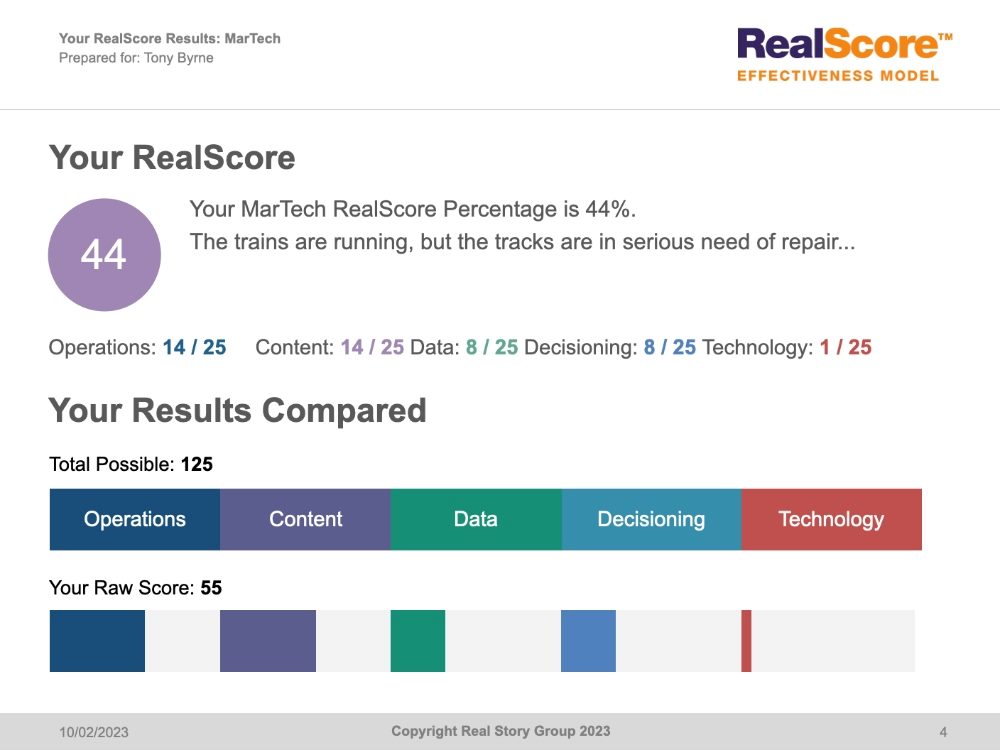The Gist
- Are we good at martech? Marketers are significantly investing in martech tools to enhance their email, content campaigns and digital experiences, but is it worth it?
- Measuring martech effectiveness. Real Story Group has introduced an online benchmarking service aimed at helping marketers assess the effectiveness of their martech stacks, particularly beyond just marketing attribution and return on ad spend.
- Navigating challenges for optimal martech outcomes. The evolving martech landscape brings challenges like achieving internal alignment across tech, data, IT and marketing operations, managing customer data privacy and contending with data and content deficiencies.
Marketers need martech tools to produce their emails, content campaigns and web and digital experiences. They spend a lot of money to do so, too. Martech tool spending in the United States is forecast to increase further over this year and next, reaching $27.11 billion in 2024.
That spending has to make sense, though, and one martech advisory and analyst firm wants to show marketers how they're doing with their martech tools and stacks against their peers. Real Story Group today released an online benchmarking service. It's a freemium service with a paid upgrade for special access and services.
Martech Tools Effectiveness: What's Your Score?
Tony Byrne, founder of Olney, Md.-based Real Story Group, said in an interview with CMSWire that marketers need to know the effectiveness of their martech stack utlilization after making significant martech investments in the past five years. Marketers face a "rising unease" that “half my stack might be wasted — we just don’t know which half.”
There's a growing realization of the importance of internal alignment, operations, staffing and customer data foundations along with a universal desire to assess martech in a structured way and compare against peers, Byrne noted. The platform includes an "effectiveness score" within and across dimensions, as well as comparisons against the industry at large.
Real Story Group asks marketers questions in the following arenas:
- Operations
- Data
- Content
- Decisioning
- Technology
Marketers want to know about effectiveness particularly beyond just marketing attribution and return on ad spend. The tool is aimed at helping enterprises understand and assess their martech stack in a structured manner, relative to their business objectives, according to Byrne. He calls the tool an "effectiveness model" rather than a "maturity model," focusing on how well enterprises are accomplishing their goals with their martech stack. The structured questions within the tool are designed to guide users through a detailed self-assessment, which can also serve as a structured conversation starter within organizations.

Related Article: A Definitive Checklist to Reduce Marketing Technology Sprawl
Martech Tools Trends: Business Readiness, Martech Stack Overflows
What are marketers contending with today? For starters, Gartner found that martech tool stack underutilization is becoming a big problem. Despite increasing investments in martech stacks, organizations are using only 33% of their available capabilities, marking a second year of decline. This underutilization not only wastes money but also poses a reputational quandary for CMOs, who must now juggle immediate utilization concerns with long-term strategic decisions about investing in emergent technologies like generative AI.
Here are some other martech tools trends shaping up the landscape for marketers:
Business Readiness: Are You Even Ready for Martech Tools?
Ensuring that marketers and their brands are ready to move to a higher level of sophistication in martech is a challenge, as it requires the right business partners and readiness across different dimensions, according to Byrne.
"Sometimes it is pushing people to here are some really cool, interesting things you can do with this technology," Byrne said, "but the business isn't ready to go and make the sorts of changes, or there just aren't the resources to execute."
Anticipated Trends: Customer Data Privacy Will Be Challenging
Byrne said challenges with privacy, compliance and more always-on personalization should be common when the results begin to trickle in on martech effectiveness. Navigating the challenges of privacy, compliance and consent remains a significant hurdle for many organizations.
According to the CMSWire State of Digital Customer Experience for 2023, 47% feel customer data protection is extremely important. They want to be leaders in data protection and give customers control over how their personal data is used. However, 20% feel it's either moderately important, slight important or not important all.
Related Article: Why Is Marketing Technology Often Discarded and Replaced?
Martech Tool Stack Overflows: Are We Getting Value?
Marketers face challenges with managing their martech stacks, often feeling overwhelmed or unsure about which parts of their stack are providing value, according to Byrne.
According to benchmarks from Gartner, a company generating $250 million in revenue could potentially squander nearly $4 million if they allocate 9% of their revenue to marketing and then spend a quarter of that marketing budget on underutilized technology.
Internal Alignment: Can Data, IT, Marketing Connect?
Achieving internal alignment with martech tools between tech, data, IT, marketing operations and staffing is a significant challenge, especially when it comes to managing customer data, according to Byrne. That internal alignment needs customer data as the foundation.Data and Content Deficiencies
Organizations often struggle with data and content deficiencies that hinder their ability to execute decisioning and personalization effectively. "They have data and content deficiencies that keep them from doing the sorts of decisioning they'd like to do," Byrne said.Always-On Personalization
Achieving always-on personalization is a struggle, as it requires a combination of data, content and decision logic, with many organizations still in the test and optimize phase, according to Byrne. "A lot of organizations are still kind of stuck in test and optimize, but they really struggle with more always-on personalization," he said.Conclusion: Evaluating Martech Tools: Bridging the Gap Between Investment and Impact
With burgeoning martech tools investments directed toward martech tools, the pressure to ensure a worthy ROI is palpable. Challenges like martech stack overflows, data and content deficiencies and the quest for always-on personalization underscore the need for a meticulous assessment of our martech tools' performance.
As the martech landscape continues to burgeon, marketers clearly need to transcend the conventional marketing attribution metrics and delving deeper into how well enterprises are meeting their business objectives with their martech arsenal.
"Effectiveness can mean a lot of things in terms of skills, resources, experience, sophistication, technology, business readiness ... all these sorts of things all roll up into effectiveness," Byrne said. "But then beyond that, what we're hoping is that (marketers) get a better sense for where they're imbalanced, because you do have to be balanced. If you're investing a lot in content operations, and decisioning, like tests and personalization, but you're not in terms of data operations and data technologies, that imbalance is going to hurt you."
